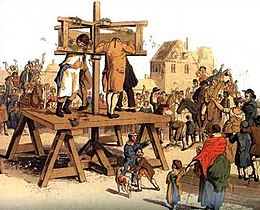This article may be too technical for most readers to understand. (August 2022) |

| Part of a series on |
| Emotions |
|---|
  |
Humiliation is the abasement of pride, which creates mortification or leads to a state of being humbled or reduced to lowliness or submission. It is an emotion felt by a person whose social status, either by force or willingly, has just decreased.[1] It can be brought about through intimidation, physical or mental mistreatment or trickery, or by embarrassment if a person is revealed to have committed a socially or legally unacceptable act. Whereas humility can be sought alone as a means to de-emphasize the ego, humiliation must involve other person(s), though not necessarily directly or willingly.
Humiliation is currently an active research topic, and is now seen as an important – and complex – core dynamic in human relationships, having implications at intrapersonal, interpersonal, institutional and international levels.[2][3]
- ^ Burton, Neel. "The Psychology of Humiliation". Archived 21 February 2023 at the Wayback Machine. Psychology Today. 27 August 2014. 10 October 2016.
- ^ Lindner, Evelin, Making Enemies: Humiliation and International Conflict. London, England: Praeger Security International, 2006.
- ^ General Assembly, Presbyterian Board of Publications, 1886 (1886). William Eves, Moore (ed.). "The Presbyterian Digest of 1886: A Compend of the Acts, and Deliverances of the General Assembly of the Presbyterian Church in the United States of America". Presbyterianism. Presbyterian Board of Publications, 1886: 238.
{{cite journal}}: CS1 maint: multiple names: authors list (link) CS1 maint: numeric names: authors list (link)